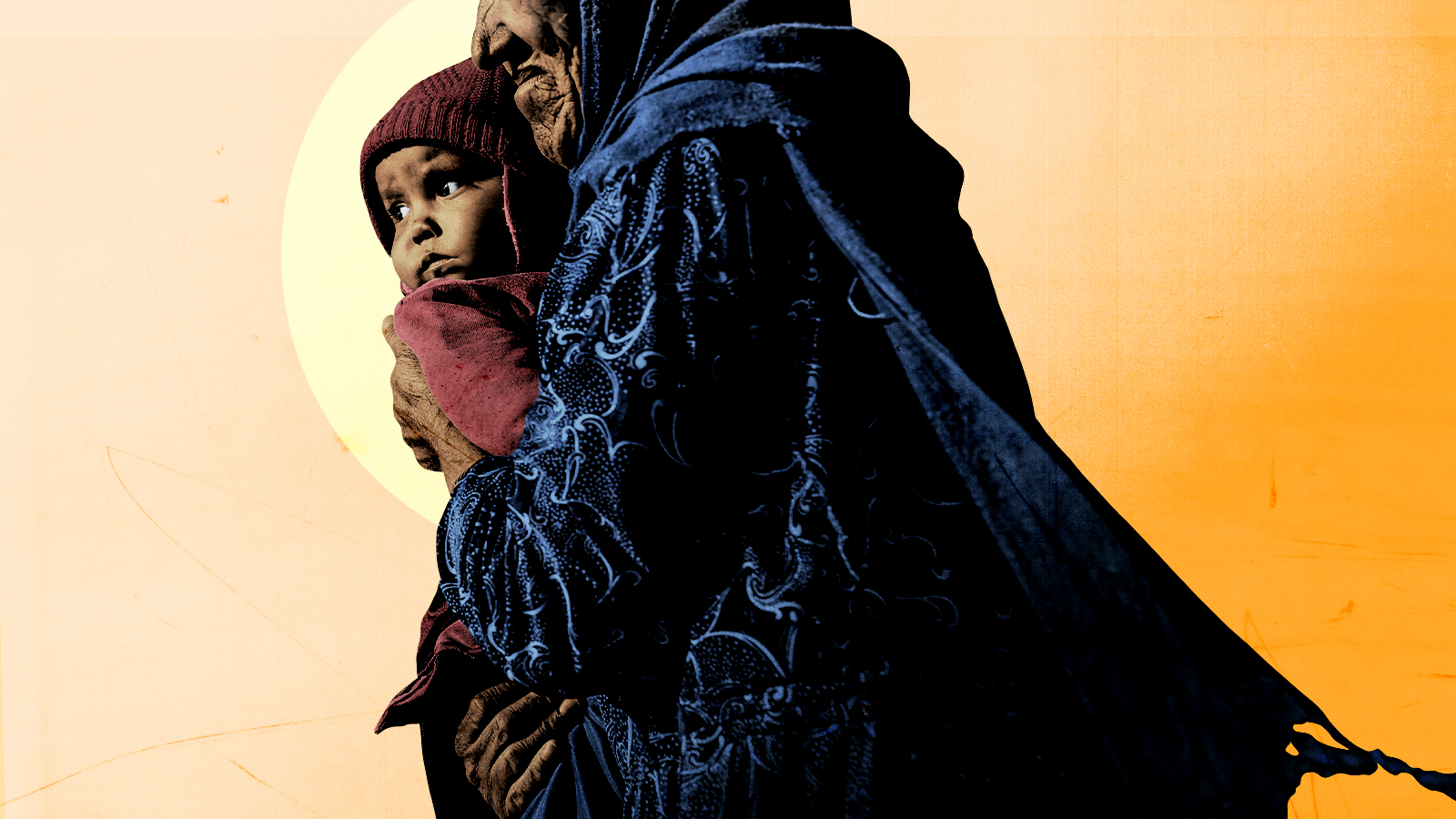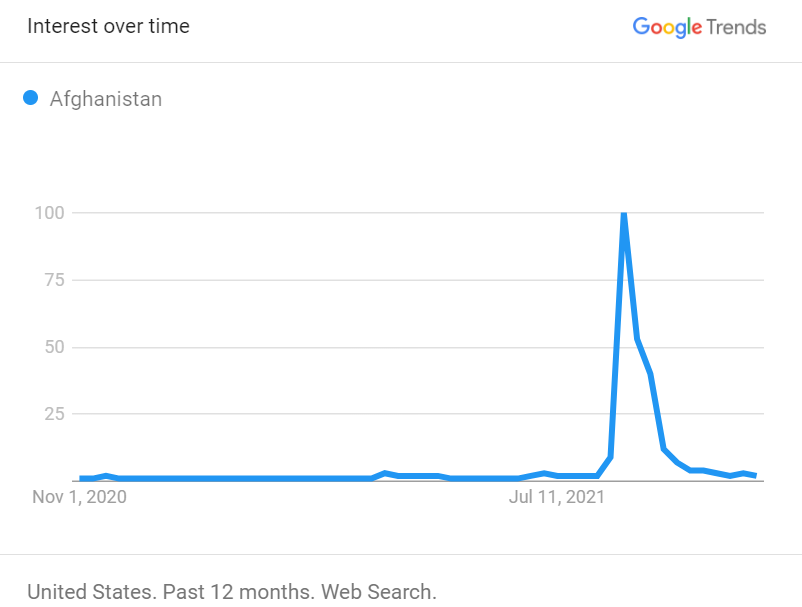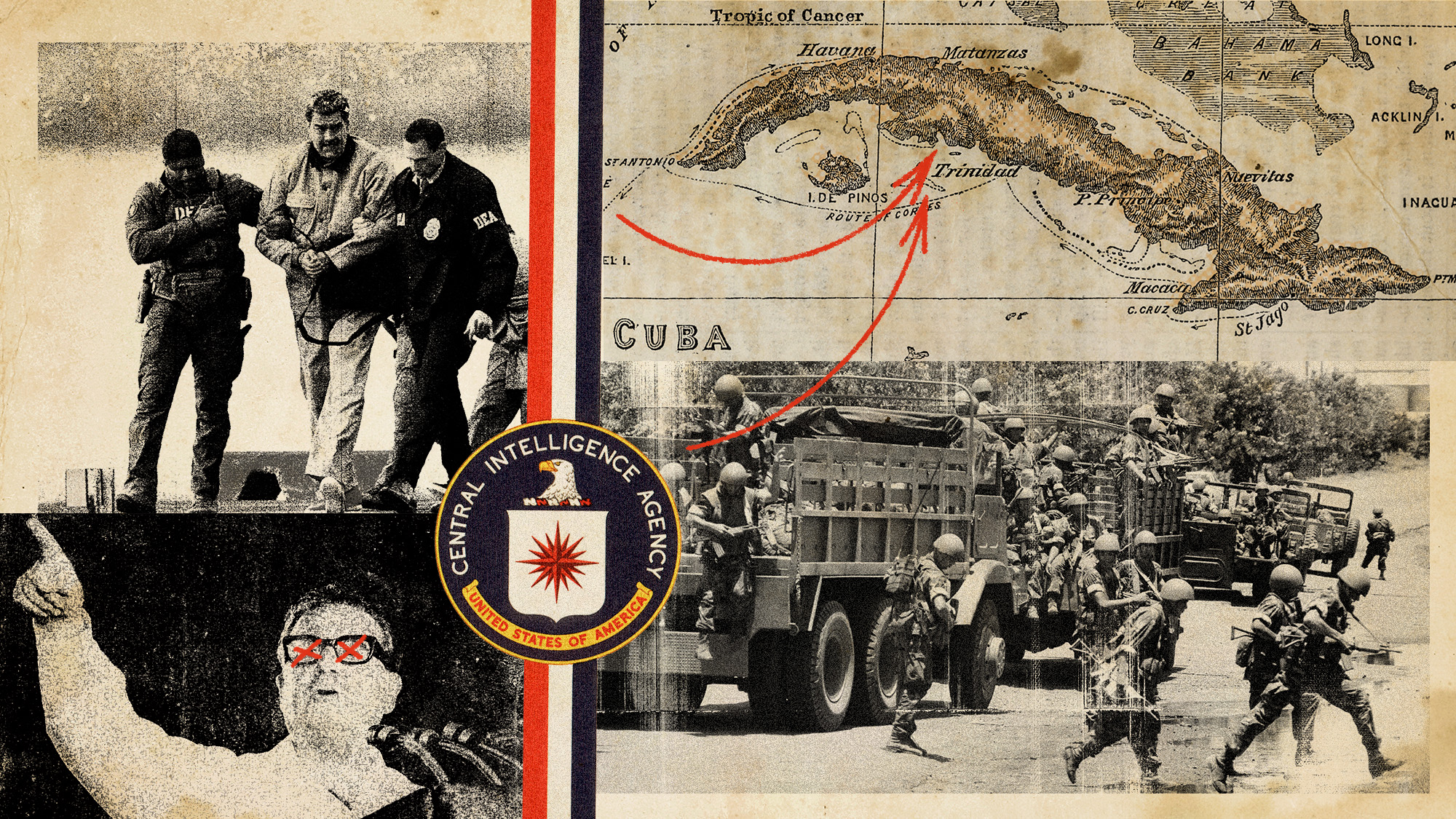American elites have gotten tellingly quiet about Afghanistan
Afghan civilians are starving, but that doesn't matter to U.S. imperial pride


A free daily email with the biggest news stories of the day – and the best features from TheWeek.com
You are now subscribed
Your newsletter sign-up was successful
Two months ago, the entire political media and a considerable fraction of the American public were in the grips of a hysterical meltdown over President Biden's withdrawal from Afghanistan. One of the biggest reasons, supposedly, was worry about the Afghan people. "This war used to be called Operation Enduring Freedom, and it's turned out not to be enduring and they're not leaving behind a society that is free," complained NBC's Richard Engel.
Today, conditions in Afghanistan have only deteriorated, yet the country has virtually vanished from the central stage of the mainstream media as well as the social media feeds of American politicians. The speed of this shift is telling. It overwhelmingly suggests all the maudlin weeping about Afghan civilians was a sham. The American elite mourned wounded imperial pride, not the welfare of Afghan civilians.
This sharp decline isn't just my observation. Here's a chart of Google search trends in the United States to get a measure of popular interest in Afghanistan. After a giant spike in August, it has totally collapsed:
The Week
Escape your echo chamber. Get the facts behind the news, plus analysis from multiple perspectives.

Sign up for The Week's Free Newsletters
From our morning news briefing to a weekly Good News Newsletter, get the best of The Week delivered directly to your inbox.
From our morning news briefing to a weekly Good News Newsletter, get the best of The Week delivered directly to your inbox.

This is because the mainstream press has ceased giving Afghanistan top billing. Network news, cable news, and the front pages of big papers have largely moved on to other things (with a few exceptions). Afghanistan is now just another poor, foreign country, displaced from the headlines by obsession with America's own enormous problems.
Now, that's not to say mainstream reporters aren't covering Afghanistan at all. On the contrary, there are many diligent and courageous journalists who continue to report on conditions on the ground. But their stories are generally buried in the back pages.
For instance, Saeed Shah at The Wall Street Journal has written vital coverage about how the Taliban is struggling to govern — how they've had to lecture their hayseed fighters not to goof off doing tourist stuff in Kabul, how electricity is failing because the Taliban haven't managed to arrange payment for suppliers, how they're fighting with psychotic Islamic State extremists, and how soldiers are struggling to adapt to civilian rule. Yaroslav Trofimov, also at the Journal, writes about how in rural Afghanistan, families and schools are celebrating the first time without chronic warfare in decades.
It's fascinating stuff. A man named Mawlawi Zubair Mutmaeen, who used to run suicide bombing squads in Kabul, is today a police chief mediating petty squabbles between married couples. "Previously I was serving Islam, and now I'm also serving Islam. There is no difference," he told Shah.
A free daily email with the biggest news stories of the day – and the best features from TheWeek.com
The general thrust of these articles seems to show the Taliban trying to govern fairly, after their own fundamentalist fashion, at least, in a way the American-backed regime — which was sensationally corrupt from start to finish — never did. Most Afghans apparently think that, all else aside, Taliban police and judges are less corrupt and provide better security. That isn't saying much, but they did end the war.
Indeed, for all their repressive ideology, beating of journalists, total lack of democracy, and so on, the Taliban are far more accountable to the Afghan population than American occupiers ever could be. If they don't provide at least a modicum of peace, security, and halfway clean government, they'll face violent unrest or armed rebellion that could topple their rule — and, unlike U.S. forces, they wouldn't be able retreat to their real homeland 7,000 miles away. Losing power isn't some distant memory for the Taliban, either. Afghanistan has been wracked with civil war for the last 40 years straight. That's a powerful, albeit unreliable, incentive even for authoritarian rulers.
Still, today Afghanistan is in dire shape. The country is badly short of food — something like 95 percent of Afghans don't have enough to eat — and its economy is in ruins. The banking system isn't working, and the Taliban have very little experience with any kind of complex bureaucracy. And the harsh Afghan winter is coming. If ever there was a time saturation media coverage of the plight of suffering civilians might do some good, now is the time — yet we see nothing of the sort.
Neither did the American elite bother much about Afghan civilians when the U.S. occupation was ongoing. Anand Gopal wrote a piece for the The New Yorker about the experiences of many Afghan women in rural areas (where the large majority of the population lives) during the occupation, and it hardly paints us as welcomed liberators. U.S. forces formed alliances of convenience with brutally repressive warlords who were previously turfed out by the Taliban. One man, Amir Dado, was particularly infamous for constantly robbing and killing civilians. Gopal writes that another U.S.-backed commander, General Sami Sadat, deliberately massacred hundreds of civilians in retaliation for Taliban conquest.
That sort of story never got much play before Biden withdrew U.S. troops. The American media often refused to cover or even notice what was happening — that rule by the U.S. and our monstrous partners was for much of the country every bit as brutal as Taliban governance. That's what happens when a country is occupied by a foreign conqueror from halfway around the world with no understanding of or interest in the subject people, but it doesn't make for enjoyable infotainment on the imperial airwaves. Now that the sting of defeat has been forgotten, our media has reverted to that old status quo.
Luckily, it seems some in the Biden administration haven't forgotten entirely about this beleaguered country. They've arranged several humanitarian aid packages totaling $474 million — the largest portion of a sizable international package for Afghanistan — and are still working to help Afghan refugees.
This falls far short of any fair accounting of what we owe the Afghan people, but it's a good start. Let's hope it is just the start.
Ryan Cooper is a national correspondent at TheWeek.com. His work has appeared in the Washington Monthly, The New Republic, and the Washington Post.
-
 The Olympic timekeepers keeping the Games on track
The Olympic timekeepers keeping the Games on trackUnder the Radar Swiss watchmaking giant Omega has been at the finish line of every Olympic Games for nearly 100 years
-
 Will increasing tensions with Iran boil over into war?
Will increasing tensions with Iran boil over into war?Today’s Big Question President Donald Trump has recently been threatening the country
-
 Corruption: The spy sheikh and the president
Corruption: The spy sheikh and the presidentFeature Trump is at the center of another scandal
-
 ‘The mark’s significance is psychological, if that’
‘The mark’s significance is psychological, if that’Instant Opinion Opinion, comment and editorials of the day
-
 A running list of the international figures Donald Trump has pardoned
A running list of the international figures Donald Trump has pardonedin depth The president has grown bolder in flexing executive clemency powers beyond national borders
-
 A running list of US interventions in Latin America and the Caribbean after World War II
A running list of US interventions in Latin America and the Caribbean after World War IIin depth Nicolás Maduro isn’t the first regional leader to be toppled directly or indirectly by the US
-
 The billionaires’ wealth tax: a catastrophe for California?
The billionaires’ wealth tax: a catastrophe for California?Talking Point Peter Thiel and Larry Page preparing to change state residency
-
 Bari Weiss’ ‘60 Minutes’ scandal is about more than one report
Bari Weiss’ ‘60 Minutes’ scandal is about more than one reportIN THE SPOTLIGHT By blocking an approved segment on a controversial prison holding US deportees in El Salvador, the editor-in-chief of CBS News has become the main story
-
 Are Donald Trump’s peace deals unraveling?
Are Donald Trump’s peace deals unraveling?Today’s Big Question Violence flares where the president claimed success
-
 Has Zohran Mamdani shown the Democrats how to win again?
Has Zohran Mamdani shown the Democrats how to win again?Today’s Big Question New York City mayoral election touted as victory for left-wing populists but moderate centrist wins elsewhere present more complex path for Democratic Party
-
 Millions turn out for anti-Trump ‘No Kings’ rallies
Millions turn out for anti-Trump ‘No Kings’ ralliesSpeed Read An estimated 7 million people participated, 2 million more than at the first ‘No Kings’ protest in June
